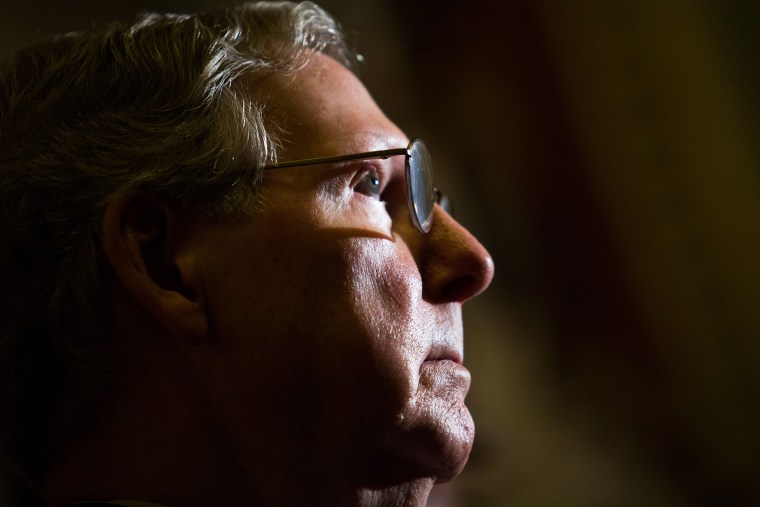Obamacare is working in Kentucky. And that's a big, big problem for Mitch McConnell.
In fact, the law’s growing success across the country is putting the entire GOP—for years committed to the law’s destruction—in a pretty awkward spot.
McConnell, who faces a tight re-election battle in his home state this fall, has looked clumsier than perhaps anyone. The GOP Senate leader has repeatedly called for Obamacare’s repeal—but now he's trying to have it both ways. McConnell says that while he still wants to repeal the law, he wants to keep Kynect, the popular state-based insurance exchange.
There’s just one problem: As a policy matter, it won’t work.
Put simply, you can’t have Kynect, at least in its current form, without the Affordable Care Act (ACA). The law created and funded the exchange marketplace, in which insurers compete for potential customers' business. Most of the 413,000 Bluegrass State residents who signed up via Kynect get a federal subsidy that makes the insurance affordable. That would cease to exist if the ACA were repealed. Repealing Obamacare would also mean saying goodbye to the federal funding that allows the state to expand Medicaid. Washington Post fact-checker Glenn Kessler called McConnell's claim that Kynect could exist without Obamacare "not credible."
McConnell doesn’t appear to be fooling too many Kentuckians. A scathing editorial this week in the Lexington Herald-Leader called out the veteran senator for being misleading.
“Kynect is the Affordable Care Act is Obamacare—even if Kentuckians are confused about which is which,” it said, adding that if the law is repealed, “the state exchange would collapse.”
“Kentuckians are waiting to learn if their five-term senator understands — or cares — how much is at stake,” the editorial concluded.
The state’s governor, Democrat Steve Beshear, has touted Kynect as a national model for health coverage. McConnell “either doesn’t understand what the ACA is, or is just trying to mislead Kentucky families for his political benefit at their expense,” Beshear told msnbc in a statement.
That Kentucky’s exchange has been so successful means McConnell is in an especially difficult position. But the truth is, the entire Republican Party is quietly shifting its tone on Obamacare—forced to confront the reality that millions of Americans now have affordable health care coverage because of the law.
To be sure, the ACA remains unpopular. A recent poll found that 55% of respondents disapprove of it. But nor do Americans like the idea of scrapping it entirely with nothing to replace it, thereby throwing millions off the coverage they’re now receiving. And since the GOP hasn’t been able to coalesce around an alternative plan, that’s essentially what the repeal position amounts to.
No aspect of the ACA brings out that reality better than the law’s Medicaid expansion, which some red states have chosen not to participate in. Because the federal government picks up 100% of the tab for the first three years, opposing the expansion amounts to leaving free money on the table that was meant to insure low-income residents.
The canaries in the coal-mine here are Republican candidates in tight races, especially high-profile Senate races, since they can’t afford to get too far out of step with voters on the issue. That’s why Scott Brown in New Hampshire, Terri Lynn Land in Michigan, Tom Cotton in Arkansas, and Thom Tillis in North Carolina all have refused to say clearly whether they’d support expanding Medicaid.
Tillis is in a particularly tight spot because, as Speaker of the North Carolina House, he was instrumental in his state’s decision to reject the expansion—a move that left around half a million struggling North Carolinians without coverage. In a sign of the changed politics on the issue, Tillis’s Democratic opponent, Sen. Kay Hagan, has lately embraced the expansion, slamming her state’s Republican leaders for declining to participate.
The shift is also showing up in ads. A Chamber of Commerce spot backing McConnell says he’s “leading the fight to fix this Obamacare mess”—not to repeal the law. Ads supporting GOP House candidates in Massachusetts and Iowa go even easier on the ACA, talking about fixing or reforming the health care system.
It’s not just those in tight races who are downplaying their opposition to Obamacare these days. It was noticeable earlier this month when Republican senators let Sylvia Burwell, President Obama’s nominee for Health and Human Services Secretary, coast through her confirmation hearings, rather than using the forum to denounce the law.
And after holding more than 50 House votes to repeal Obamacare, Speaker John Boehner quietly conceded at a Rotary Club meeting in Ohio last month that repealing the ACA “isn’t the answer.” The House has no scheduled votes or hearings on the law this month.
It's gotten so bad that Gov. Bobby Jindal of Louisiana recently took his party to task for losing their nerve in the anti-Obamacare struggle.
"[E]ven many conservative ‘thinkers’ in Washington have given in to ObamaCare fatalism,” Jindal wrote on the Fox News website. “They may not say so in public, but they fully believe that talk of the law’s repeal exists only in the land of unsophisticated rubes.”
